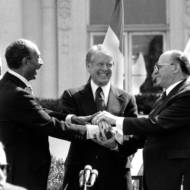
Will Arab regimes break free from the grip of Palestinian rejectionism and follow Egypt’s lead making peace with the Jewish state?
By: Lt. Col. (res.) Dr. Shaul Bartal, Begin-Sadat Center for Strategic Studies
In stark contrast to the extraordinary vision and courage displayed by Israeli PM Menachem Begin and Egyptian President Anwar Sadat in signing the peace treaty 40 years ago, the Palestinian leadership emerges as staunchly rejectionist and a serial squanderer of opportunities for peace.
One can only hope that the Arab regimes, which appear increasingly reluctant to remain hostage to Palestinian rejectionism, will be courageous enough to follow in Sadat’s visionary footsteps.
This week will mark the 40th anniversary of the Israeli-Egyptian peace treaty. The treaty was accompanied by the framework agreements that were signed at Camp David in September 1978 with the mediation of then-US President Jimmy Carter. Israeli PM Menachem Begin and Egyptian President Anwar Sadat undoubtedly displayed rare diplomatic vision and political courage in their approach to resolving the conflict.
On the Arab spectrum, Egypt stood out as a path-breaking state compared to the Palestinian leadership, which, since that time, has missed opportunities for peace over and over again.
In his memoirs, Carter recounts that he sent emissaries to Yasser Arafat and to the PLO in an effort to persuade them to join Sadat’s initiative and the peace summit at Camp David. Sadat, too, tried to convince Arafat to join the peace initiative both before and after his historic visit to Jerusalem. The Palestinians refused.
In an interview to the newspaper Al-Hawadat on December 30, 1977, only a month after his visit to Jerusalem, Sadat pointed to the Palestinians’ rejectionism and said their insistence on getting all or nothing had led them, since the days of the British Mandate, to squander every opportunity for a compromise.
Sadat also quoted Iraqi King Faisal, who remarked that “the Palestinians don’t want a solution at all.” Egyptian FM Boutros Ghali, later the UN Secretary General, likewise said at the time that “the exaggerated concern with the Palestinian issue must be stopped once and for all.”
Sadat did not ignore the Palestinian problem. On the contrary: he dealt with it courageously, as is evident from his speeches and from the Framework Agreement for Peace he signed with Israel in September 1978.
That agreement sought to advance the Palestinians’ interest by offering a five-year autonomy plan for the West Bank and Gaza, after which a permanent settlement would be formulated (though the sides did not agree that the permanent settlement would necessarily lead to a Palestinian state).
Yet it was proved time after time that Abba Eban’s maxim, according to which “the Palestinians never miss an opportunity to miss an opportunity,” is a factual description of the reality. Palestinian textbooks make almost no mention of the Camp David Accords, and the Palestinian media portray Sadat as a traitor to the Arab cause.
In its fourth national conference, held in Lebanon on April 28, 1981, after the Israeli-Egyptian peace treaty had been implemented, the Popular Front for the Liberation of Palestine – the second most important organization in the PLO – passed a resolution opposing the Camp David peace initiative (i.e., Begin’s autonomy plan) because accepting it would have meant the end of the Palestinian problem.
Similar resolutions were passed by Fatah and remain in force today. Since rejecting the Israeli-Egyptian peace, and despite entering the “peace” process in the context of the Oslo Accords, the Palestinian leadership has managed to rebuff the proposals of five Israeli PMs – including Benjamin Netanyahu in his famous Bar-Ilan speech – on establishing a Palestinian state in Gaza and most of the West Bank.
Lately, the heads of the Arab states have appeared less and less willing to remain hostage to Palestinian rejectionism. One can only hope that many of them will walk the brave and visionary path that President Sadat charted 40 years ago.
Shaul Bartal is a research associate at the Begin-Sadat Center for Strategic Studies.
Do You Love Israel? Show Your Support!
Donate to vital charities that protect Israelis and help educate and inspire millions around the world to support Israel too!
Now more than ever, Israel needs your help to fight the battle of public opinion. Israel’s enemies are using social media to incite brutal terror against innocent civilians. Please help us fight back!
Source: United with Israel
